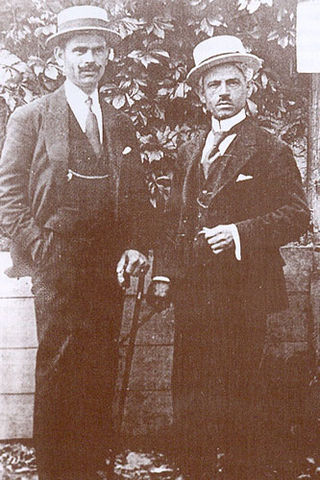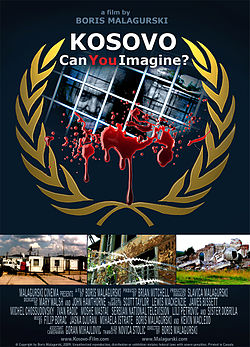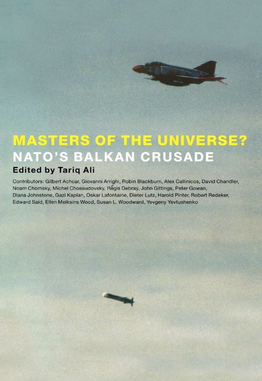
The Balkans, corresponding partially with the Balkan Peninsula, is a geographical area in southeastern Europe with various geographical and historical definitions. The region takes its name from the Balkan Mountains that stretch throughout the whole of Bulgaria. The Balkan Peninsula is bordered by the Adriatic Sea in the northwest, the Ionian Sea in the southwest, the Aegean Sea in the south, the Turkish straits in the east, and the Black Sea in the northeast. The northern border of the peninsula is variously defined. The highest point of the Balkans is Musala, 2,925 metres (9,596 ft), in the Rila mountain range, Bulgaria.

The Kosovo War was an armed conflict in Kosovo that lasted from 28 February 1998 until 11 June 1999. It was fought between the forces of the Federal Republic of Yugoslavia, which controlled Kosovo before the war, and the Kosovo Albanian separatist militia known as the Kosovo Liberation Army (KLA). The conflict ended when the North Atlantic Treaty Organization (NATO) intervened by beginning air strikes in March 1999 which resulted in Yugoslav forces withdrawing from Kosovo.

Kosovo, officially the Republic of Kosovo, is a landlocked country in Southeast Europe with partial diplomatic recognition. It is bordered by Albania to the southwest, Montenegro to the west, Serbia to the north and east and North Macedonia to the southeast. It covers an area of 10,887 km2 (4,203 sq mi) and a population of approximately 1.6 million. Kosovo has a varied terrain, with high plains along with rolling hills and mountains, some of which reach an altitude of over 2,500 m (8,200 ft). It's climate is mainly continental with some Mediterranean and alpine influences. The Kosovo's capital and the most populous city is Pristina; other major cities and urban areas include Prizren, Ferizaj, Gjilan and Peja.

The Kosovo Liberation Army was an ethnic Albanian separatist militia that sought the separation of Kosovo, the vast majority of which is inhabited by Albanians, from the Federal Republic of Yugoslavia (FRY) and Serbia during the 1990s. Albanian nationalism was a central tenet of the KLA and many in its ranks supported the creation of a Greater Albania, which would encompass all Albanians in the Balkans, stressing Albanian culture, ethnicity and nation.
The Račak massacre or Račak operation was the massacre of 45 Kosovo Albanians that took place in the village of Račak in central Kosovo in January 1999. The massacre was perpetrated by Serbian security forces in response to Albanian separatist activity in the region. The Serbian government refused to let a war crimes prosecutor visit the site, and maintained that the casualties were all members of the rebel Kosovo Liberation Army (KLA) killed in combat with state security forces.
The legitimacy under international law of the 1999 NATO bombing of the Federal Republic of Yugoslavia has been questioned. The UN Charter is the foundational legal document of the United Nations (UN) and is the cornerstone of the public international law governing the use of force between States. NATO members are also subject to the North Atlantic Treaty.

The North Atlantic Treaty Organization (NATO) carried out an aerial bombing campaign against the Federal Republic of Yugoslavia during the Kosovo War. The air strikes lasted from 24 March 1999 to 10 June 1999. The bombings continued until an agreement was reached that led to the withdrawal of the Yugoslav Army from Kosovo, and the establishment of the United Nations Interim Administration Mission in Kosovo, a UN peacekeeping mission in Kosovo. The official NATO operation code name was Operation Allied Force whereas the United States called it Operation Noble Anvil ; in Yugoslavia the operation was incorrectly called Merciful Angel, possibly as a result of a misunderstanding or mistranslation.

The Manaki brothers, Yanaki and Milton, were two Aromanian photography and cinema pioneers within the Balkan Peninsula and the Ottoman Empire. They were the first to bring a film camera and create a motion picture in the city of Manastir, an economic and cultural center of Ottoman Rumelia. Their first film, The Weavers, was a 60-second documentary of their grandmother spinning and weaving; this is regarded as the first motion picture shot in the Balkans. The Manaki brothers used a 35 mm Urban Bioscope camera that Yanaki imported from London in 1905. Yanaki and Milton filmed documentaries about various aspects of life in the city of Manastir.
The political status of Kosovo, also known as the Kosovo question, is the subject of a long-running political and territorial dispute between the Serbian government and the Government of Kosovo, stemming from the breakup of Yugoslavia (1991–92) and the ensuing Kosovo War (1998–99). In 1999, the administration of the Autonomous Province of Kosovo and Metohija was handed on an interim basis to the United Nations under the terms of UNSCR 1244 which ended the Kosovo conflict of that year. That resolution reaffirmed the territorial integrity of Serbia over Kosovo but required the UN administration to promote the establishment of 'substantial autonomy and self-government' for Kosovo pending a 'final settlement' for negotiation between the parties.

Kosovo–Turkey relations are the historic and current relations between the Republic of Kosovo and the Republic of Turkey. Kosovo has an embassy in Ankara and Turkey has an embassy in Prishtina. Both nations are predominantly Muslim and have sought to join the EU.

Stolen Kosovo is a 2008 Czech documentary film by director Václav Dvořák and producer Aleš Bednář about events during and following the Kosovo War.

Kosovo: Can You Imagine? is a 2009 documentary film directed by Serbian Canadian Boris Malagurski about the plight of Serb communities living in Kosovo at the time the documentary was filmed. Former Canadian general Lewis MacKenzie, former Canadian diplomat James Byron Bissett, former UNMIK officer John Hawthorne and economist Michel Chossudovsky appear in the film.

Numerous war crimes were committed by all sides during the Kosovo War, which lasted from 28 February 1998 until 11 June 1999. According to Human Rights Watch, the vast majority of abuses were attributable to the government of Slobodan Milošević, mainly perpetrated by the Serbian police, the Yugoslav army, and Serb paramilitary units. During the war, regime forces killed between 7,000–9,000 Kosovar Albanians, engaged in countless acts of rape, destroyed entire villages, and displaced nearly one million people. The Kosovo Liberation Army has also been implicated in atrocities, such as kidnappings and summary executions of civilians. Moreover, the NATO bombing campaign has been harshly criticized by human rights organizations and the Serbian government for causing roughly 500 civilian casualties.

Al Jazeera Balkans (AJB) is an international news television station headquartered in Sarajevo, Bosnia and Herzegovina aimed at the media markets of the countries that used to be constituent units of SFR Yugoslavia. It is part of the Al Jazeera Media Network.
The Batajnica mass graves are mass graves that were found in 2001 near Batajnica, a suburb of Belgrade, the capital of Serbia. The graves contained the bodies of 744 Kosovar Albanians civilians that were killed during the Kosovo War. The mass graves were found on the training grounds of the Yugoslav Special Anti-Terrorist Unit (SAJ). Dead bodies were brought to the site by trucks from Kosovo; most were incinerated before burial. After the war, SAJ restricted investigators' access to the firing range, and continued live-firing exercises whilst forensic teams tried to investigate the massacre.

Jeff (Daniel) Silva is a Boston filmmaker and film programmer. Ivan & Ivana (2011) and Balkan Rhapsodies: 78 Measures of War (2008), have been exhibited at film festivals and museums internationally, including MoMA's Documentary Fortnight, The Viennale, Visions du Reel, Valdivia, Flahertiana, and DocAviv.. In 2016, he worked on Linefork, a feature about Lee Sexton. Silva programmed cinema for 15 years at the Balagan film series, which he co-founded in 2000. He was a teaching fellow at Harvard University. Silva taught at the School of the Museum of Fine Arts (SMFA) in Boston.
Ivan & Ivana is a documentary directed by Jeff Daniel Silva in 2011.

The Insurgency in Kosovo began in 1995, following the Dayton Agreement that ended the Bosnian War. In 1996, the Kosovo Liberation Army (KLA) began attacking Serbian governmental buildings and police stations. This insurgency would lead to the more intense Kosovo War in February 1998.

The Weight of Chains is a 2010 Canadian documentary film directed by Boris Malagurski. The film argues that the breakup of Yugoslavia was "orchestrated by Western powers in furtherance of imperial ambitions". According to the filmmaker, it also presents stories of "good people in evil times". It was released on December 17, 2010.

Masters of the Universe? NATO's Balkan Crusade is a 2000 anthology of texts critical of the NATO bombing of Yugoslavia during the Kosovo War, edited by Tariq Ali.














